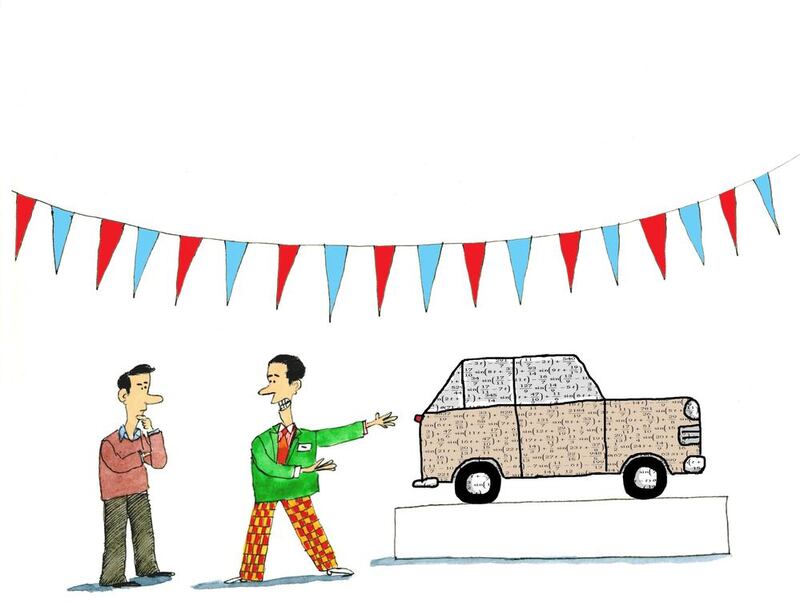I have had a challenging time going over my child's maths homework of late. I've got to be very careful about how I handle this – I don't want to put him off — because it turns out that the better you are at maths, the more likely you are to enjoy a lucrative financial life.
Our (calm) conversations revolve around the need to understand the principles of how to think about these sums and approach them, assuring him that this will help him have a great life.
I've just checked that out and yes, at the risk of stating the obvious, this is backed up: there are studies out there that link mathematical competence to better financial literacy. Makes sense.
So how can maths help us with our financial lives?
Well, there's the obvious ability to add up expenses and subtract from income at a basic level, but there's a lot more, like figuring out which mortgage to take out, which retirement plan to go for or which car to buy, to name but a few of life's decisions.
Dealing with our financial lives means dealing with numerical questions.
For example, do you go for a 36-month car loan with a deposit of Dh15,000 or a 48-month one with a deposit of Dh11,500? And what does the APR (annual percentage rate) work out to be in absolute terms over the life of the loan?
A lot of the time, we defer to working things out based on proportionality. In other words, we feel our way around how different one set of figures is from another.
Now, proportionality is key – it can help us figure out which side of the beach to set up a picnic if we can easily see that there are more than double the number of people on one side compared to the other. This might sound simple enough, but is it?
If you think about it, we can pretty much see that there are, say, nine people on one side and 15 on another, but what if the numbers go up? Say there are now 44 people on one side and 50 on the other, could you really tell the difference at a glance? The difference in absolute numbers is the same: there are six fewer people on one side — but we can't see that — right now both sides look like they have the same number of people enjoying themselves.
And that's what happens with the cost of things: the larger the price ticket, the more prone we are to guesswork, and the more prone we are to making decisions based on proportionality.
Let me explain: you decide to buy a car. You've set aside a budget. You go to a showroom, you walk determinedly to a salesperson – you're not going to be swayed by any showy model on the floor – oh no, you've done your research online and you know exactly what you want, need and can afford.
Then the salesperson tells you the car you're looking for isn't available right now, but this one is very similar – would you like to take it for a test drive? You think to yourself, sure, what's the harm in that? And a few kilometres later you're in love. The salesperson tells you the car you're looking for is say Dh89,500, and this one is "slightly" more at Dh99,500.
It's not that much more, you say to yourself. That's your proportional brain talking – it sees the price of the model you just drove around as only about one ninth higher than the basic model you went there to buy.
But in absolute terms, the price difference is huge – it's Dh10,000. If we are to assume that your hourly rate is Dh100 – just to make things easy – then that's the equivalent of 100 hours of work. That's two and a half weeks of your life. Are the slightly more comfortable seats and gimmicks on the dashboard worth you working for free for a couple of weeks of your life? If you think of it like this, my feeling is that you wouldn't have to think too much before turning the deal down.
So, the lesson here is that the bigger the numbers are, the more we tend to think in relative terms, not absolute terms – in other words, proportionality takes over. Remember, working things out in terms of how many hours it'd take you to earn the money you'd spend on something makes the cost more real to you.
The other lesson is that, yes, we need to sit down and work out the maths. Let the numbers do the talking, not the colour of the paintwork or the purr of the engine.
The evidence out there shows that the better we are at maths, the better our financial decisions.
Being able to divide 500 in half makes people less likely to default on their mortgages and more likely to properly plan their pensions.
So the next time you're stumped by a mathematical question, instead of feeling you're being attacked, take a step back and tackle it again – with the conviction that numbers are your friends for a better life.
Nima Abu Wardeh is the founder of the personal finance website www.cashy.me. You can contact her at nima@cashy.me
Do your maths homework – it’ll pay you back with interest
The evidence out there is that the better we are at maths, the better the quality of our financial decisions, our "on the money" columnist writes.

More from the national




